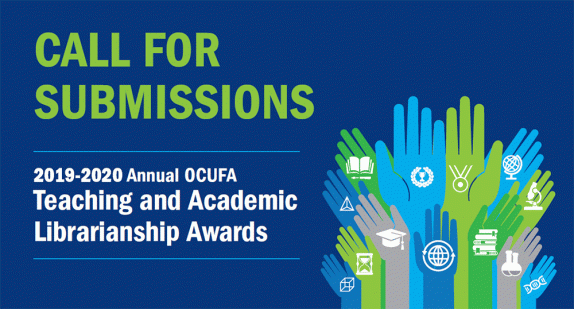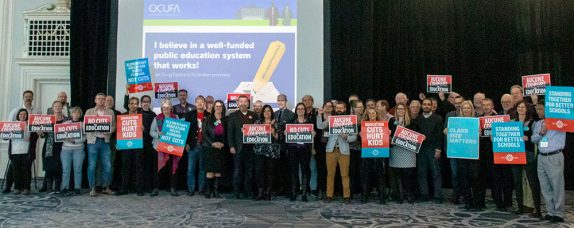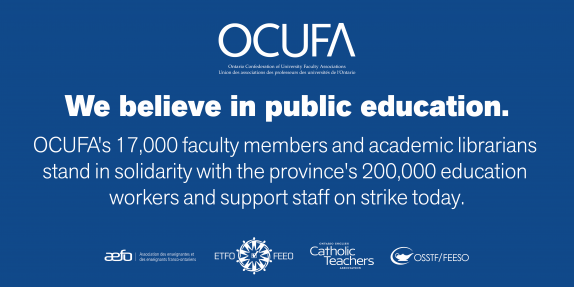OCUFA’s 17,000 faculty, academic librarians, and other academic professionals are deeply concerned about the equity implications of the COVID-19 crisis on Ontario’s health care system and economy, and the adverse impacts both will have on the most marginalized in our society.
While it may be difficult to remember life before COVID-19, it is important to recall the state of Ontario’s economic and health care systems before the pandemic. We must compare the devastating effects of the pandemic with where we were before it began.
Ontario has the lowest public service spending per capita in all of Canada, including the lowest levels of funding per person for health care. It also has the lowest per-student funding levels and the most students per faculty member in the country. In addition, increasing numbers of Ontario campus workers are in precarious jobs. In fact, over 50 per cent of undergraduate courses are taught by contract faculty, many of whom lack job security, fair pay, and benefits. And in Ontario, like much of Canada, precarious employment, housing insecurity, and limited access to health care are rampant and most adversely impact those on the margins: women, racialized and Indigenous persons, people with disabilities, and migrants.
While the current economic crisis was triggered by the COVID-19 pandemic, it has been in the making for a long time. Many workers have been left with a difficult choice: go to work and risk illness, or follow public health guidelines and stay home. As a result, being able to pay rent and put food on the table has become a struggle. This experience is amplified for precarious workers who have no paid sick leave, and many of whom live paycheque-to-paycheque. In effect, many workers do not have the option to stay home or participate in social distancing measures to curb the spread of the virus. Without sufficient economic support, these workers are forced to work, even when that choice runs counter to public health advice.
Academic staff in Ontario believe that in a public health crisis the government should put the health of all individuals, regardless of their income level, ahead of economic considerations. The government’s response to this crisis must ensure short and long-term support for Ontarians, particularly the most vulnerable. Now is not the time for half-measures, it is the time for strong economic investment in families, communities, and public institutions.
Faculty members and academic librarians across Ontario have stepped up to play their part in “flattening the curve,” through supporting social distancing measures and moving to remote teaching. For many faculty members, the cancellation of classes and the immediate move to online platforms have led to unprecedented workload and anxiety levels.
Similar to most other workplaces, universities and colleges have been severely impacted by the global pandemic and resulting economic crisis. With the closure of campuses, and social isolation and anxiety resulting from social distancing measures for students, faculty are having to multiply their efforts to ensure that their students are supported emotionally and academically during this chaotic time.
Although academic institutions across Canada cancelled in-person classes, many of Ontario’s campus libraries remained open. On some campuses, academic librarians and library staff are expected to jeopardize their health and well-being by coming into work.
Precarious workers, who make up over 50 per cent of the campus workforce in Ontario, are disproportionately impacted. Contract faculty on most campuses are not being compensated for the additional time and energy they are spending to ensure that their courses are properly wrapped up. They are also facing growing levels of insecurity as universities and colleges are uncertain about the status of spring and summer terms.
Faculty and academic librarians with elder and child care responsibilities, the majority of whom are women and single parents, are experiencing immense pressure to continue working overtime while caring for their loved ones as a result of school and daycare closures. Academic staff with disabilities, many of whom are already struggling with “normal” workloads due to inadequate accommodations, are also being asked to increase their workloads. Indigenous cultural pedagogical approaches to teaching are being impacted by these measures. These issues are compounded for contract faculty within these groups.
Elsewhere on campus, many foodservice and custodial staff have been laid off due to the full or partial closure of campus operations, and students relying on both on-campus and off-campus jobs are experiencing a loss of income and struggling to pay the bills. The forced closure of student residences has also put students, particularly international students, in a particularly vulnerable position. And across Canada, racialized students and faculty are experiencing heightened levels of xenophobia and racism as a direct result of this pandemic.
To date, the government has implemented measures that do not address the needs of the most vulnerable members of our communities. Asking people to stay home, without offering them the financial support to do so is harmful and counterproductive. In contrast, provinces such as Alberta, have provided income support for persons who are self-isolating due to COVID-19. To alleviate housing concerns, British Columbia has launched a rental aid program for residents. Ontario should follow suit and provide timely supports for workers who are unable to work due to lay-offs, closures, or health concerns.
As OCUFA has previously stated, we strongly support the demands of the Fight for $15 and Fairness campaign to immediately introduce paid sick day provisions and provide at least $500 to workers who need to self-isolate, are currently on EI, or are mandated out of work by the recent closure of all non-essential services in the province.
We also support the calls of student groups for the government to include international students in the Ontario Health Insurance Plan (OHIP) and other governmental emergency benefit programs, and provide viable housing options to students who cannot leave campus residences.
Now is the time for strong short and long-term economic investments that ensure the most vulnerable Ontarians come through this global health crisis.
Ontario’s faculty and academic librarians call on the provincial government to step-up to support workers who are struggling now.












